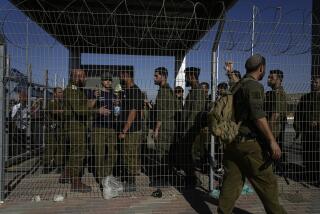Guantanamo Detainees Expected to Claim Torture
- Share via
WASHINGTON — Four detainees at the Guantanamo Bay naval base who will face U.S. military commission proceedings next week are expected to claim that the government obtained confessions and other evidence through coercive techniques, including torture, Pentagon officials acknowledged Tuesday.
Defense attorneys are expected to cite statements by recently released detainees who have said they were physically abused and stripped of their clothing while being held at the detention facility in Cuba, commission officials said.
“I expect that defense lawyers who think that any of those statements are involuntary will argue that the statements shouldn’t come in because it’s not credible, because it was made involuntarily,” said retired Army Maj. Gen. John D. Altenburg Jr., who oversees the military commission process.
Altenburg said the four defendants each would be given a one-day preliminary hearing in the first U.S. military commission proceedings to take place since the end of World War II.
The four are the first of 15 detainees, out of a total of 585 Guantanamo prisoners, who have been singled out for trial by military commission by President Bush.
If detainees succeed in challenging evidence on the grounds it was obtained through widely criticized interrogation methods, it could affect the prosecution of other prisoners at Guantanamo. Even prisoners who do not claim they were subjected to torture could argue that they offered false confessions because they feared it, Altenburg said.
U.S. officials deny any abuse of Guantanamo detainees, who are held by the United States outside the protection of the Geneva Convention rules on treatment of prisoners.
Defense attorneys face problems in challenging coercive interrogations, said Neil Katyal, a Georgetown University law professor. He said there was no apparent rule requiring disclosure to defense counsel about instances of alleged torture or coercion. As a result, statements from other prisoners used as evidence could have been coerced, but attorneys would have no way of knowing it.
Katyal also said that Pentagon officials had not pledged that evidence obtained through coercion would be excluded, a break with civil trials and standard military court-martial proceedings.
“The reason it’s excluded is so interrogators are not given an incentive to be coercive,” Katyal said. “All Altenburg said is that it would be decided on a case-by-case basis, perhaps in secret. And that is clearly at odds with American military justice.”
Relatives of some of the detainees are expected to attend the preliminary hearings in Cuba, the first time any of the prisoners will be allowed to see family members.
The detainees are David Hicks, an Australian, and three Al Qaeda suspects from Yemen and Sudan. Hicks is accused of conspiring to commit war crimes and attempted murder. The other three detainees are Salim Ahmed Hamdan of Yemen, allegedly a driver and security guard for Al Qaeda leader Osama bin Laden who is charged with conspiring to commit murder and attacks on civilians; Ali Hamza Ahamad Sulayman al Bahlul of Yemen, a Bin Laden bodyguard accused of conspiracy to commit war crimes; and Ibrahim Ahmed Mahmoud al Qosi of Sudan, another Bin Laden bodyguard accused of conspiring to commit war crimes.
The military commission proceedings differ from combatant status review tribunals. The combatant status tribunals, begun in response to a Supreme Court ruling that required all of the detainees to have access to U.S. courts, are meant to determine whether prisoners are properly classified as enemy combatants or should be freed.
Twenty-seven detainees who have undergone the proceedings have not been provided lawyers. Under the military commission trials, detainees will be tried on war crimes and other charges and will have lawyers.
Reporters and nongovernmental organizations such as the American Civil Liberties Union will be allowed to observe the proceedings next week. But the military commission has reserved the right to close hearings or require observers to watch via a broadcast that is delayed to allow for the omission of any “protected information.”
ACLU lawyer Tim Edgar said his organization and others that have criticized the proceedings would monitor the trials in part because they feared the administration’s war on terrorism could subject increasing numbers of defendants to the process.
“This parallel system of justice replaces regular civilian courts, replaces regular military courts with these kinds of second-class tribunals, the likes of which we haven’t seen since World War II,” Edgar said.
Altenburg, a former assistant judge advocate general in the Army, acknowledged potential problems but said the proceedings would fulfill the obligation to be “full and fair.”
“That trial will look very much like any trial any of you have observed in the United States,” Altenburg said.










